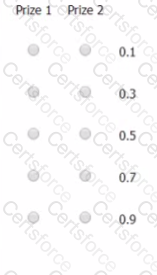At a carnival game, a winning player spins a wheel that always lands on either Prize 1 or Prize 2 to determine which of the two prizes he or she wins. The probability that the prize wheel indicates Prize 2 Is double the probability that It indicates Prize 1. If a player does not want the prize that the prize wheel first indicates, then he or she may spin the wheel again. In such cases, the player must accept whichever prize the prize wheel indicates on the second spin.
Select for Prize I the number nearest to the probability that a winning player who wants Prize 1 will receive Prize 1 after one or two spins of the prize wheel, and select for Prize ^the number nearest to the probability that a winning player who wants Prize 2 will receive Prize 2 after one or two spins of the prize wheel. Make only two selections, one in each column.

Submit